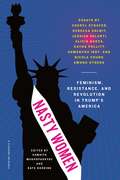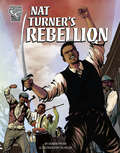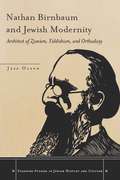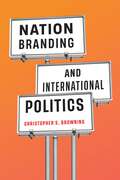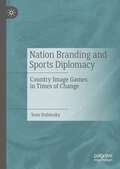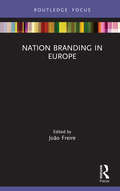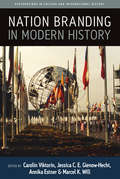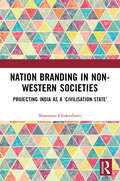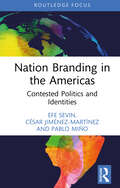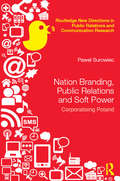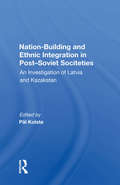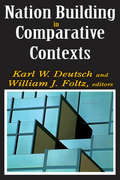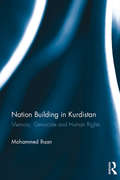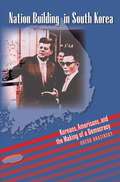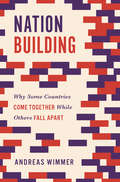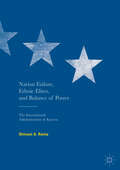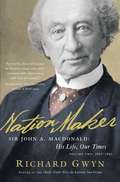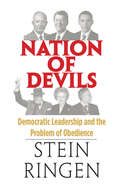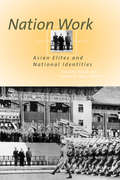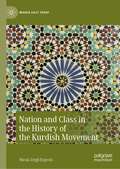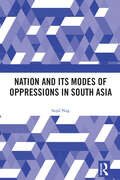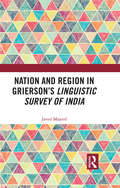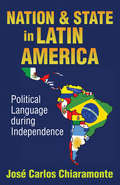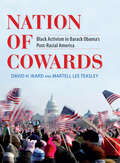- Table View
- List View
Nasty Women: Feminism, Resistance, and Revolution in Trump’s America
by Kate Harding Samhita MukhopadhyayTwenty-Three Leading Feminist Writers on Protest and Solidarity. When 53 percent of white women voted for Donald Trump and 94 percent of black women voted for Hillary Clinton, how can women unite in Trump's America? Nasty Women includes inspiring essays from a diverse group of talented women writers who seek to provide a broad look at how we got here and what we need to do to move forward. Featuring essays byREBECCA SOLNIT on Trump and his "misogyny army,"CHERYL STRAYED on grappling with the aftermath of Hillary Clinton's loss,SARAH HEPOLA on resisting the urge to drink after the election,NICOLE CHUNG on family and friends who support Trump,KATHA POLLITT on the state of reproductive rights and what we do next,JILL FILIPOVIC on Trump's policies and the life of a young woman in West Africa,SAMANTHA IRBYon racism and living as a queer black woman in rural America,RANDA JARRAR on traveling across the country as a queer Muslim American,SARAH HOLLENBECK on Trump's cruelty toward the disabled,MEREDITH TALUSAN on feminism and the transgender community, andSARAH JAFFE on the labor movement and active and effective resistance,among others.
Nat Turner's Rebellion (Movements and Resistance)
by Shawn PryorNat Turner, an enslaved black man, believed he was chosen by God to battle against the evils of slavery. Driven by visions, Turner banded with six others, and on August 22, 1831, his rebellion began with attacks at plantations in Southampton, Virginia. As he and his group moved from plantation to plantation, dozens of enslaved men joined them. Finally, the local militia put an end to their movement, arresting and hanging many of the men involved. Nat Turner’s rebellion deepened the divide between Americans who wanted to abolish slavery and those who wanted to protect it, setting the groundwork for the American Civil War.
Nathan Birnbaum and Jewish Modernity: Architect of Zionism, Yiddishism, and Orthodoxy
by Jess OlsonThis book explores the life and thought of one of the most important but least known figures in early Zionism, Nathan Birnbaum. Now remembered mainly for his coinage of the word "Zionism," Birnbaum was a towering figure in early Jewish nationalism. Because of his unusual intellectual trajectory, however, he has been written out of Jewish history. In the middle of his life, in the depth of World War I, Birnbaum left his venerable position as a secular Jewish nationalist for religious Orthodoxy, an unheard of decision in his time. To the dismay of his former colleagues, he adopted a life of strict religiosity and was embraced as a leader in the young, growing world of Orthodox political activism in the interwar period, one of the most successful and powerful movements in interwar central and eastern Europe. Jess Olson brings to light documents from one of the most complete archives of Jewish nationalism, the Nathan and Solomon Birnbaum Family Archives, including materials previously unknown in the study of Zionism, Yiddish-based Jewish nationalism, and the history of Orthodoxy. This book is an important meditation on the complexities of Jewish political and intellectual life in the most tumultuous period of European Jewish history, especially of the interplay of national, political, and religious identity in the life of one of its most fascinating figures.
Nation Branding and International Politics
by Christopher S. BrowningNation branding is regarded as essential for competitiveness among countries, but the idea of branding nations is often derided as lacking seriousness. While nation branding has been on the radar of scholars of marketing, communication, and media studies, as well as political geography for decades, it has only made a small dent into the international relations field.In Nation Branding and International Politics Christopher Browning argues that international relations should take nation branding seriously. Nation branding not only involves the issues of culture, identity, and status – which are of principal concern to IR – but it is also a different and potentially fruitful way of reconceptualizing statehood. Mobilizing work on ontological security, anxiety, status, and distinction, and grounding the analysis in a broader historical context, Browning finds that nation branding is politically significant, though not necessarily for the reasons its advocates claim. Specifically, the book raises important questions about nation branding’s influence on the constitution of national identity, the reframing of citizenship, and the topography of contemporary geopolitics.Nation Branding and International Politics considers how status, prestige, and reputation are constructed and maintained in international society, and how, perhaps, this construction and maintenance may be changing – just as the practice of nation branding is changing.
Nation Branding and Sports Diplomacy: Country Image Games in Times of Change
by Yoav DubinskyThis book critically discusses the role of sports in nation branding and public diplomacy during the years 2020 and 2022, as the world was going through a global pandemic and health, economic, social, and political crises. The book argues that the use of sports for nation branding and public diplomacy goals is not new, but the changes the world went through required nations, places, communities, and individuals to modify and adapt the ways they use sports for country image purposes. After discussing global changes, the book outlines the theoretical frameworks of nation branding and public diplomacy, and discusses their manifestations through the evolution of the FIFA World Cup, the postponed Tokyo 2020 Olympic Games, the role of Title IX in American sports, the European Super League, the Oregon22 World Athletics Championships, the emergence of sport-tech diplomacy, and though the role of sports and the global order in an ever-changing world.
Nation Branding in Europe (Routledge Focus on Nation Branding)
by João FreireThis book provides an explanation of nation branding theory and practice within the European context, exploring how countries build and manage their reputations globally. Each chapter focuses on a specific European country, selected from a cross-section of large, medium-sized and small countries to provide a breadth of cases from across the continent. The chapters are written from a wide range of academic and practitioner perspectives. Nation Branding in Europe is valuable supplementary reading for advanced undergraduate, postgraduate and doctoral students interested in nation branding and will appeal to students from marketing, communications, and international relations disciplines. Outside of academia, the book will be of interest to those working in the areas of public diplomacy and strategic communications, as well as public relations and branding practitioners involved in designing nation branding campaigns.
Nation Branding in Modern History (Explorations in Culture and International History #9)
by Carolin Viktorin Jessica Gienow-Hecht Annika Estner Marcel K. WillA relatively recent coinage within international relations, “nation branding” designates the process of highlighting a country’s positive characteristics for promotional purposes, using techniques similar to those employed in marketing and public relations. Nation Branding in Modern History takes an innovative approach to illuminating this contested concept, drawing on fascinating case studies in the United States, China, Poland, Suriname, and many other countries, from the nineteenth century to the present. It supplements these empirical contributions with a series of historiographical essays and analyses of key primary documents, making for a rich and multivalent investigation into the nexus of cultural marketing, self-representation, and political power.
Nation Branding in Non-Western Societies: Projecting India as a ‘Civilisation State’
by Shantanu ChakrabartiA country’s stature in global politics is often determined by its popular image and public perceptions, as reflected in global media. While ‘nation branding’ as a term and a tool of analysis in Social Sciences has emerged prominently since the 1990s, the practice of ‘positive’ projection of states, regions and locality along with non-state institutions has deeper historical roots. Apart from nation branding, the cultural turn in ‘International Relations’ has led to popularisation of analytical concepts like ‘soft power’ and ‘civilisation’ or ‘civilisational states.’The present work focuses on two of these concepts: ‘nation branding’ and ‘civilisation state’ and traces the historical process of evolution in Indian nation building project. It analyses the evolving concept of ‘civilisation state’ and its association with the strong urge for autonomy along with the self-perception of national and cultural greatness shared by the Indian elite leading to a search for identity and recognition of the intra-regional and extra-regional linkages in terms of shared cultural and historical identity. It also looks into the process of continuity from independence to present times and to what extent this has influenced Indian elite thinking and conceptualisation of India’s status in global affairs.Print edition not for sale in South Asia (India, Sri Lanka, Nepal, Bangladesh, Pakistan and Bhutan)
Nation Branding in the Americas: Contested Politics and Identities (Routledge Focus on Nation Branding)
by Efe Sevin César Jiménez-MartÍnez Pablo MiñoNation Branding in the Americas: Contested Politics and Identities provides an overview of nation branding in the Americas, an often neglected continent(s) in debates about the creation, dissemination and management of national images.Drawing on insights from promotional cultures, nationalism, geopolitics, media and communication, as well as their own research, the authors look at national promotion experiences in twelve countries - Canada, the United States, Mexico, Costa Rica, Colombia, Ecuador, Peru, Bolivia, Brazil, Uruguay, Argentina and Chile - , examining how these cases relate to broader challenges and commonalities, such as the relationship between nation branding and stereotypes, invisibility, heritage or internal contradictions. Nation Branding in the Americas: Contested Politics and Identities is an important contribution to the study of practices and concepts such as nation branding, public diplomacy, soft power, and strategic communication. It highlights the multifaceted nature of nation branding, and how this can be used to perpetuate local and global hierarchies, legitimize the agendas of specific governments, and discipline the inhabitants of a nation, but also become a venue for people to negotiate and communicate the kind of society they want to be. The book will therefore be of interest for undergraduate, postgraduate, and doctoral students specialized in marketing, media and communication, and international relations. It will also appeal to professionals in public diplomacy, strategic communication, public relations, and branding, offering a broad overview to the practice and discussion of national promotion in an increasingly contested and cacophonic global communication environment.
Nation Branding, Public Relations and Soft Power: Corporatising Poland (Routledge New Directions in PR & Communication Research)
by Pawel SurowiecNation Branding, Public Relations and Soft Power: Corporatizing Poland provides an empirically grounded analysis of changes in the way in which various actors seek to manage Poland’s national image in world opinion. It explores how and why changes in political economy have shaped these actors and their use of soft power in a way that is influenced by public relations, corporate communication, and marketing practices. <P><P>By examining the discourse and practices of professional nation branders who have re-shaped the relationship between collective identities and national image management, it plots changes in the way in which Poland’s national image is communicated, and culturally reshaped, creating tensions between national identity and democracy. The book demonstrates that nation branding is a consequence of the corporatization of political governance, soft power and national identity, while revealing how the Poland "brand" is shaping public and foreign affairs. <P><P>Challenging and original, this book will be of interest to scholars in public relations, corporate communications, political marketing and international relations.
Nation Builder: John Quincy Adams and the Grand Strategy of the Republic
by Charles N. EdelAmerica's rise from revolutionary colonies to a world power is often treated as inevitable. But Charles N. Edel's provocative biography of John Q. Adams argues that he served as the central architect of a grand strategy whose ideas and policies made him a critical link between the founding generation and the Civil War-era nation of Lincoln.
Nation Building And Ethnic Integration In Post-soviet Societies: An Investigation Of Latvia And Kazakstan
by Jorn Holm-hansenOf all the states of the former Soviet Union, it is in Latvia and in Kazakstan that the titular nation represents the lowest share of the total population: as of 1997, approximately 57 per cent in Latvia and 50 per cent in Kazakstan. In such a situation it is difficult to see how the titular (Latvian, Kazak) culture can serve as a consolidating ele
Nation Building in Comparative Contexts
by Karl W. Deutsch William J. FoltzWhat is and what makes a nation? What forces work for and against the emergence of new nations? What does the emergence of a nation mean to its people, and what does it mean to international stability? Nation Building in Comparative Contexts answers these questions. Nine leading area specialists compare and analyze the long history of nationalism in Europe, with its shorter histories in the Americas, Asia, and Africa. The result is an outstanding contribution to understanding the problems confronting today's emerging nations, one that remains of importance to the field.The essays in this book provide the tools for comparison and analysis across continents and centuries. The chapters dealing with Europe, where the political and historical evidence is richest, stress the broadest outlines of the nation-making process. The chapter on Asia concentrates on revolutionary war; the two chapters on Africa, where the creation or failure of nation-states is a matter of the political situation of the moment, raise the largest number of concrete problems.Investigators have discovered that the making and breaking of nations is a process that must be studied in its general and uniform aspects, especially if the unique features of each country and epoch are to be understood better. The essays in this book are first steps in the comparison and analysis across the continents and centuries. To some degree, each combines concerns of the historian, social scientist, and of policy-maker and statesman.
Nation Building in Kurdistan: Memory, Genocide and Human Rights
by Mohammed IhsanThe Kurdish people and the Kurdish Regional Government faced huge challenges rebuilding their nation and identity after the atrocities and human rights abuses committed by Saddam Hussein and his regime. In 2005 a new Iraqi constitution recognized as genocide the persecution of Faylee Kurds, the disappearance of 8,000 males belonging to the Barzanis and the chemical attacks of Anfal and Halabja paving the way to the investigations and claim by Kurdish people. This book provides in-depth analysis of the tensions caused by the Kurdish experience, the claim for the independence of a united Kurdistan and the wider tendency towards political and social fragmentation in Iraqi society.
Nation Building in South Korea
by Gregg A. BrazinskyIn this ambitious and innovative study Gregg Brazinsky examines American nation building in South Korea during the Cold War. Marshaling a vast array of new American and Korean sources, he explains why South Korea was one of the few postcolonial nations that achieved rapid economic development and democratization by the end of the twentieth century. Brazinsky contends that a distinctive combination of American initiatives and Korean agency enabled South Korea's stunning transformation. On one hand, Americans supported the emergence of a developmental autocracy that spurred economic growth in a highly authoritarian manner. On the other hand, Americans sought to encourage democratization from the bottom up by fashioning new institutions and promoting a dialogue about modernization and development.Expanding the framework of traditional diplomatic history, Brazinsky examines not only state-to-state relations, but also the social and cultural interactions between Americans and South Koreans. He shows how Koreans adapted, resisted, and transformed American influence and promoted socioeconomic change that suited their own aspirations. Ultimately, Brazinsky argues, Koreans' capacity to tailor American institutions and ideas to their own purposes was the most important factor in the making of a democratic South Korea.
Nation Building: Why Some Countries Come Together While Others Fall Apart (Princeton Studies in Global and Comparative Sociology)
by Andreas WimmerA new and comprehensive look at the reasons behind successful or failed nation buildingNation Building presents bold new answers to an age-old question. Why is national integration achieved in some diverse countries, while others are destabilized by political inequality between ethnic groups, contentious politics, or even separatism and ethnic war? Traversing centuries and continents from early nineteenth-century Europe and Asia to Africa from the turn of the twenty-first century to today, Andreas Wimmer delves into the slow-moving forces that encourage political alliances to stretch across ethnic divides and build national unity.Using datasets that cover the entire world and three pairs of case studies, Wimmer’s theory of nation building focuses on slow-moving, generational processes: the spread of civil society organizations, linguistic assimilation, and the states’ capacity to provide public goods. Wimmer contrasts Switzerland and Belgium to demonstrate how the early development of voluntary organizations enhanced nation building; he examines Botswana and Somalia to illustrate how providing public goods can bring diverse political constituencies together; and he shows that the differences between China and Russia indicate how a shared linguistic space may help build political alliances across ethnic boundaries.Wimmer then reveals, based on the statistical analysis of large-scale datasets, that these mechanisms are at work around the world and explain nation building better than competing arguments such as democratic governance or colonial legacies. He also shows that when political alliances crosscut ethnic divides and when most ethnic communities are represented at the highest levels of government, the general populace will identify with the nation and its symbols, further deepening national political integration.Offering a long-term historical perspective and global outlook, Nation Building sheds important new light on the challenges of political integration in diverse countries.
Nation Failure, Ethnic Elites, and Balance of Power: The International Administration of Kosova
by Shinasi A. RamaThis book examines the history of nation-building in Kosova as a model of how the theories behind nation-building, state-building and peace-building can succeed or fail. The author argues that two missing factors led to successful state-building but failed nation-building in Kosova: the balance of power and the ethnic elite. The author uses his unique expert knowledge gained over thirty years of study to present a thorough overview of international administration and nation-building in Kosova.
Nation Maker: Sir John A. Macdonald: His Life, Our Times
by Richard J. GwynAn exciting story, passionately told and rich in detail, this major biography is the second volume of the bestselling, award-winning John A: The Man Who Made Us, by well-known journalist and highly respected author Richard Gwyn.John A. Macdonald, Canada's first and most important prime minister, is the man who made Confederation happen, who built this country over the next quarter century, and who shaped what it is today. From Confederation Day in 1867, where this volume picks up, Macdonald finessed a reluctant union of four provinces in central and eastern Canada into a strong nation, despite indifference from Britain and annexationist sentiment in the United States.But it wasn't easy. The wily Macdonald faced constant crises throughout these years, from Louis Riel's two rebellions through to the Pacific Scandal that almost undid his government and his quest to find the spine of the nation: the railroad that would link east to west. Gwyn paints a superb portrait of Canada and its leaders through these formative years and also delves deep to show us Macdonald the man, as he marries for the second time, deals with the birth of a disabled child, and the assassination of his close friend Darcy McGee, and wrestles with whether Riel should hang.Indelibly, Gwyn shows us Macdonald's love of this country and his ability to joust with forces who would have been just as happy to see the end of Canada before it had really begun, creating a must-read for all Canadians.From the Hardcover edition.
Nation Of Devils: Democratic Leadership and the Problem of Obedience
by Stein RingenOxford University political theorist Stein Ringen offers a thought-provoking meditation on the art of democratic rule: how does a government persuade the people to accept its authority? Every government must make unpopular demands of its citizens, from levying taxes to enforcing laws and monitoring compliance to regulations. The challenge, Ringen argues, is that power is not enough; the populace must also be willing to be led. Ringen addresses this political conundrum unabashedly, using the United States and Britain as his prime examples, providing sharp opinions and cogent analyses on how the culture of national obedience is created and nurtured. He explores the paths leaders must choose if they wish to govern by authority rather than power, or, as the philosopher Immanuel Kant put it, to "maintain order in a nation of devils. "
Nation Work: Asian Elites and National Identities
by Timothy Brook Andre SchmidAs increasing attention is drawn to globalization, questions arise about the fate of "the nation," a political and social unit that for centuries has seemed the common-sense way to organize the world. In Nation Work, Timothy Brook and Andr Schmid draw together eight essays that use historical examples from Asian countries--China, India, Korea, and Japan--to enrich our understandings of the origin and growth of nations. Asia provides fertile ground for this inquiry, the volume argues, because in Asia the history of the modern nation has been inseparable from global influences in the form of Western imperialism. Yet, while the impetus for building a modern national identity may have come from the need to fashion a favorable place in a world system dominated by Western nations, those engaged in nationalist enterprises found their particular voices more often in relation to tensions within Asia than in relation to more generic tensions between Asia and the West. With topics ranging from public health measures in nineteenth-century Japan through textual scholarship of Tamil intellectuals, the willful division of Korea's history from China's, the development of China's cotton industry, and the meaning of "postnational-ism" for Chinese artists, the essays reveal the fascinating array of sites at which nation work can take place. This will be essential reading for historians and social scientists interested in Asia. Timothy Brook is Professor of History, Stanford University. Andr Schmid is Assistant Professor of East Asian Studies, University of Toronto.
Nation and Class in the History of the Kurdish Movement (Middle East Today)
by Nicola Degli EspostiThis book covers over a century of history, from the emergence of Kurdish nationalism in the interwar period to the 2010s when, for the first time in modern history, Kurdish forces controlled two autonomous political entities in Iraq and Syria, as well as over a hundred municipalities in south-eastern Turkey. In these years of momentous advance for Kurdish forces across the region, Kurdish politics remains deeply divided into competing movements pursuing irreconcilable projects for the future of the nation. The author investigates the origins of the present divide in the history of Kurdish nationalism. The book turns the historical sociology to study nationalism as embedded in social conflicts through a comparative analysis of the history of the Kurdish movement in Iraq and Turkey, by reassessing the literature on Kurdish politics and filling its gaps with numerous interviews with witnesses and scholars.
Nation and Its Modes of Oppressions in South Asia
by Sajal NagThis volume examines nationhood as a concept and how it became the basis of political discourse in South Asia. It studies the emergence of nationalism in modern states as a powerful, omnipotent, and omnipresent form of political identity in the nineteenth and twentieth centuries. This book examines the idea of a nation, as it originated in medieval Europe, as an unending process of &‘othering&’ individuals, groups, and communities to establish its hegemony, exclusivity, and absolute power within a political discourse. It sheds light on how these new political frameworks in the name of nationalism resulted in conflicts and bloodshed. It unleashed politics of retribution and facilitated majoritarianism, minority persecution, and collective authoritarianism which devastated individuals and collectivities. Further, the author also discusses various prominent ideas and contemporary theories on nationalism alongside pivotal socio-cultural factors which have significantly shaped the formation of modern nation states and their politics. Topical and nuanced, this book will be indispensable to researchers, scholars, and readers interested in nationalism, political science, modern history, political theory, political philosophy, political sociology, political history, post-colonial studies, and South Asia studies.
Nation and Region in Grierson’s Linguistic Survey of India
by Javed MajeedGeorge Abraham Grierson’s Linguistic Survey of India is one of the most complete sources on South Asian languages. This book is the first detailed examination of the Survey. It shows how the Survey collaborated with Indian activists to consolidate the regional languages in India. By focusing on India as a linguistic region, it was at odds with the colonial state’s conceptualisation of the subcontinent, in which religious and caste differences were key to its understanding of Indian society. A number of the Survey’s narratives are detachable from its rigorous linguistic imperatives, and together with aspects of Grierson’s other texts, these contributed to the way in which Indian nationalists appropriated and reshaped languages, making them religiously charged ideological symbols of particular versions of the subcontinent. Thus, the Survey played an important role in the emergence of religious nationalism and language conflict in the subcontinent in the 20th century. This volume, like its companion volume Colonialism and Knowledge in Grierson’s Linguistic Survey of India, will be a great resource for scholars and researchers of linguistics, language and literature, history, political studies, cultural studies and South Asian studies.
Nation and State in Latin America: Political Language During Independence
by Jose Carlos ChiaramonteNo one in Latin American historiography has paid more attention to questions related to the emergence of nations than Jose Carlos Chiaramonte. Reflecting on eighteenth- and nineteenth-century uses of the concept of nation in Europe and the Americas, Chiaramonte argues that historical questions related to the term "nation" derive from its changing meaning in different contexts. The historian would be better advised to focus on the development of forms of state organization, and the emergence of national states, rather than the "nation" as a cultural community prior to independence.Nation and State in Latin America begins by examining the effects on historians of the ideological and methodological prejudice spread by contemporary nationalism on the historical studies of Latin America. Chiaramonte analyzes uses of concepts such as "nation" and "state" in both Europe and the Americas. Chiaramonte considers the prominence of sovereign "pueblos" (cities and townships) and their role during independence. He argues the non-existence of nationalities in the period and proves that feelings of collective identity at that time amounted mainly to local affections.He concludes with an analysis of major trends in federalism and the law of nature and nations, crucial to understanding the political concepts of the age of birth of modern Latin American nations. This book covers the whole of Latin America, making use of comparative viewpoints. The different national intonations of the concept of sovereignty and the nuances of the federal and confederate forms of the state are examined in detail.
Nation of Cowards: Black Activism in Barack Obama's Post-Racial America (Blacks in the Diaspora)
by Martell Lee Teasley David H. IkardAn argument for intense and organized activism from the African American community to generate discussion on race in the United States.In a speech from which Nation of Cowards derives its title, Attorney General Eric Holder argued forcefully that Americans today need to talk more—not less—about racism. This appeal for candid talk about race exposes the paradox of Barack Obama’s historic rise to the US presidency and the ever-increasing social and economic instability of African American communities. David H. Ikard and Martell Lee Teasley maintain that such a conversation can take place only with passionate and organized pressure from Black Americans, and that neither Obama nor any political figure is likely to be in the forefront of addressing issues of racial inequality and injustice. The authors caution Blacks not to slip into an accommodating and self-defeating “post-racial” political posture, settling for the symbolic capital of a Black president instead of demanding structural change. They urge the Black community to challenge the social terms on which it copes with oppression, including acts of self-imposed victimization.“A clarion call to our nation’s conscience. Free from overly academic jargon, but full of powerful wordplay and brilliant juxtapositions, this book is a fascinating tour de force from start to finish. Those seeking a clear and concise explanation of the state of African America and the ongoing need for a “black agenda” during—and even after—the administration of the first African American president need look no further.” —Reiland Rabaka, author of The Hip Hop Movement and Du Bois: A Critical Introduction“Nation of Cowards offers an analysis of the Obama administration is as thorough as it is compact. Here are the hard questions that must be asked of the first black presidency and an insightful draft of how history may regard it. Ikard and Teasley are well ahead of that curve.” —Jelani Cobb, author of The Substance of Hope:Barack Obama & the Paradox of Progress
